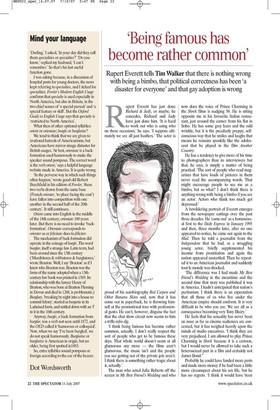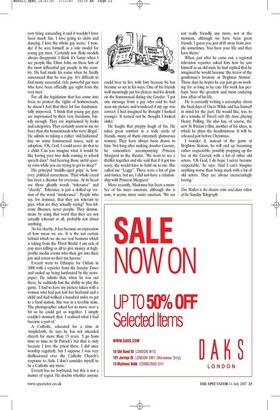'Being famous has become rather common'
Rupert Everett tells Tim Walker that there is nothing wrong with being a bimbo, that political correctness has been 'a disaster for everyone' and that gay adoption is wrong Rupert Everett has just done Richard & Judy, or maybe, he concedes, Richard and Judy have just done him 'It is hard to work out who is using who on these occasions,' he says. 'I suppose ultimately we are all just hustlers.' The actor is proud of his autobiography Red Carpets and Other Banana Skins and, now that it has come out in paperback, he is throwing himself at the promotional tour with professional gusto. He can't, however, disguise the fact that the chat show circuit now seems to him a trifle infra dig.
'I think being famous has become rather common, actually. I don't really respect the sort of people who get to be famous these days. That whole world doesn't seem at all glamorous any more — the films aren't glamorous, the music isn't and the people you see getting out of the private jets aren't. I think there is something rather tragic about it, actually.'
The man who acted Julia Roberts off the screen in My Best Friend's Wedding and who now does the voice of Prince Charming in the Shrek films is nudging 50. He is sitting opposite me in his favourite Italian restaurant, just around the corner from his flat in Soho. He has some grey hairs and the odd wrinkle, but it is the peculiarly preppy, selfconscious way that he smiles and laughs that means he remains spookily like the adolescent that he played in the film Another Country.
He has a tendency to give more of his time to photographers than to interviewers but that, he says, is simply a matter of being practical. 'The sort of people who read magazines that have loads of pictures in them never read the accompanying words. That might encourage people to see me as a bimbo, but so what? I don't think there is anything wrong with being a bimbo if you are an actor. Actors who think too much get depressed.'
A bewildering portrait of Everett emerges from the newspaper cuttings over the past three decades. He 'came out' as a homosexual first to the Daily Express in January 1995 and then, three months later, after no one appeared to notice, he came out again to the Mail. Then he told a journalist from the Independent that he had, as a struggling young actor, briefly supplemented his income from prostitution and again the nation appeared unstartled. Then he repeated it to an American journalist and suddenly tout le monde was shocked.
'The difference was I had made My Best Friend's Wedding in the meantime and the second time that story was published it was in America. I hadn't anticipated that nation's puritanism. I think there is an expectation that all those of us who live under the American empire should conform. It is very difficult to be who you are. We are all as a consequence becoming very Tony Blairy.'
He feels that his sexuality has never been an issue as far as cinema audiences are concerned, but it has weighed heavily upon the minds of studio executives. 'I think they are very prejudiced. I am allowed to play Prince Charming in Shrek because it is a cartoon, but I would never be allowed to take such a heterosexual part in a film and certainly not James Bond."
Probably he could have landed more parts and made more money if he had been a little more circumspect about his sex life, but he has no regrets. 'I think it would have been very tiring concealing it and it wouldn't have been much fun. I love going to clubs and dancing. I love the whole gay scene.' I wonder if he sees himself as a role model for young gay men. 'Certainly not. Role models always disappoint. I think it's funny when I see people like Elton John on these lists of the most influential gay people in the country. He had made his name when he finally announced that he was gay. It's difficult to find many successful, rich, powerful gay men who have been officially gay right from the very start.'
For all the legislation that has come into force to protect the rights of homosexuals, he doesn't feel that their lot has fundamentally improved. 'I think that young gay guys are imprisoned by their very freedoms, funnily enough. They are imprisoned by looks and categories. They certainly seem to me no freer than the homosexuals who were illegal.' He admits to taking a rather 'old-fashioned' line on some homosexual issues, such as adoption. 'Oh, God, I could never do that to a child. Can you imagine what it would be like having your two dads coming to school speech days? And hearing those awful queeny rows while you are trying to get to sleep?'
His principal 'middle-aged gripe' is, however, political correctness. 'That whole creed has been a disaster for everyone. At its heart are those ghastly words "tolerance" and "charity". Tolerance is just a dolled-up version of the word "intolerance". People who say, for instance, that they are tolerant to gays, what are they actually saying? You tolerate illnesses, never people. They demonstrate by using that word that they are not actually tolerant at all, probably not about anything.
'As for charity, it has become an expression of how mean we are. It is the net curtain behind which we do our real business which is taking from the Third World. I am sick of pop stars telling us all to give money at highprofile media events who then get into their jets and return to their tax havens.'
Everett went to Ethiopia for Oxfam in 2000 with a reporter from the Sunday Times and ended up being lambasted by the newspaper. He admits that, when he was out there, he suddenly lost the ability to play the game. 'I had to have my picture taken with a woman who had just lost her husband and a child and had walked a hundred miles to get to a food station. She was in a terrible state. The photographer asked her to move over a bit so he could get us together. I simply couldn't stomach that. I realised what I had become a part of.'
A Catholic, educated for a time at Ampleforth, he says he has not attended church for more than 15 years. 'I go from time to time to St Patrick's but that is only because I love the priest there. I did once worship regularly, but I suppose I was very disillusioned over the Catholic Church's response to Aids. I don't consider myself to be a Catholic any more.'
Everett has no boyfriend, but this is not a matter of regret. He doubts whether anyone could bear to live with him because he has become so set in his ways. One of his friends well-meaningly put his picture and his details on the homosexual dating site Gaydar. 'I got one message from a guy who said he had seen my picture and wondered if my age was correct. I had imagined he thought I looked younger. It turned out he thought I looked older.'
He laughs that preppy laugh of his. He takes great comfort in a wide circle of friends, many of them extremely glamorous women. They have always been drawn to him Not long after makingAnother Country, he remembers accompanying Princess Margaret to the theatre. 'We went to see a thriller together and she said that if it got too scary, she would have to hold on to me. She called me "Leggy". There were a lot of gins and tonics, but no, I did not have a relationship with Princess Margaret.'
More recently, Madonna has been a member of his inner sanctum, although she is now, it seems, more outer sanctum. 'We are not really friendly any more, not at the moment, although we have been great friends. I guess you just drift away from people sometimes. You have your life and they have theirs.'
When, just after he came out, a regional television reporter asked him how he saw himself as an old man, he had replied that he imagined he would become `the terror of the gentleman's lavatory at Brighton Station'. These days he hopes he can just go on working for as long as he can. His work has perhaps been the greatest and most enduring love affair of his life.
He is currently writing a screenplay about the final days of Oscar Wilde and has himself in mind for the part. He would like, too, to do a remake of Travels with My Aunt, playing Henry Pulling. He also has, of course, the new St Trinian's film, another of his ideas, in which he plays the headmistress. It will be released just before Christmas.
I wonder if, instead of the gents at Brighton Station, he will end up becoming rather respectable, possibly propping up the bar at the Garrick with a lot of other old actors. 'Oh God, I do hope I never become respectable,' he says. 'And I can't imagine anything worse than being stuck with a lot of old actors. They are always excruciatingly boring.'
Tim Walker is the theatre critic and diary editor of the Sunday Telegraph.


















































 Previous page
Previous page